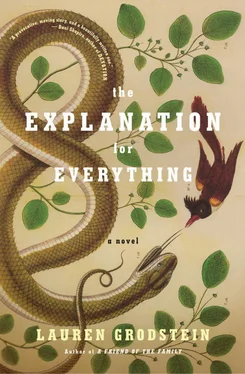How to explain? “We, you know, we insert receptors into their brains. While they’re under general anesthesia,” he said. “And then we hook the receptors up to an EEG reader. The rats don’t even notice.” This wasn’t exactly true—the rats awoke from anesthesia groggy and pissed off, with little white plugs sticking out of their bloodied heads, but there was no reason to get into the nitty-gritty on his interview.
“You stick receptors?” Linda asked. “Into their brains?”
“That is how they do it,” Marty Reuben, the botanist, said. “I’ve read about this sort of thing.”
The biologists seemed much too dismayed for what was, in the annals of animal research, actually fairly benign intervention, but they didn’t judge him unkindly for it. They just seemed chastened by their ignorance, and apologized, when he accepted the job, that they really didn’t have the resources to conduct brain surgery on rats but perhaps they could support him in simpler research, if he was so inclined?
A simple house, a simple life, a simple job, simple research: he was so inclined.
“Laurence and I would love to have you and your wife to dinner once you get settled,” said Nina Graff.
He hadn’t wanted to explain it to them in the interview. “Louisa was killed in a car accident last winter,” Andy said. “But thank you for your invitation.”
Members of the Florida Prison Parole Board:
It is with great sadness that I write, once again, my victim impact statement regarding parole for Oliver McGee, prisoner N24633. Mr. McGee killed my wife, Louisa Waite, in a motor vehicle accident in August 2004. As you undoubtedly know, Mr. McGee’s blood alcohol content the night he drove his car into my wife’s was almost four times the legal limit; that he was able to drive the car at all seems like the darkest sort of miracle, since someone that drunk shouldn’t be able to fit a key into the ignition, much less put a car into drive. Yet there he was, nineteen years old, swerving back and forth on Eighty-seventh Street before slamming, for no reason except the perverse misfiring of the drunken brain, into the Mazda my wife was driving to McDonald’s to bring back dinner for me. Our daughters were then one and almost four.
In previous letters I have prevailed upon you to keep Mr. McGee locked up as a preventive measure, a way to keep a killer behind bars for the protection of society, the logic being (logic that’s been borne out by my own professional studies into alcoholism) that once a drunk always a drunk—or, to be more politic about it, the logic being that alcoholism is a genetic state, not a curable disease, and therefore Oliver McGee will almost certainly drink again, and if he does, there is a chance he will kill again. He has shown neither the ability to stay sober nor the conviction that he should, if he must drink, at least turn in his keys.
I believe that he might kill again. But this is not why I want him to stay in jail, as he has already inflicted his damage upon me and I am not generous enough anymore to give a shit about who else he hurts. This time I am writing my letter with a different set of justifications, a different set of reasons I want Oliver McGee to rot in jail. Expressly:
Have I ever mentioned to you, esteemed members of the parole board, that my wife, Lou, was a NICU nurse for eleven years? Do you know, parole board members, what a NICU nurse does? Let me explain the work for you here: A NICU nurse warms and soothes and feeds with a dropperlike feeder the palm-sized babies who were born at twenty-five, twenty-six weeks’ gestation. These are babies who by all means should not be alive, but by some miracle (that word again, and again so dark) they are alive, and they will grow and thrive, except for the ones who won’t. The ones who won’t, with the translucent skin threaded by desperate veins, and the tangerine-sized heads in knit caps, and the eyes covered by strips of gauze because the undeveloped corneas will be damaged by the light—these babies with the brain damage and the breathing trouble and the spastic limbs and the chickenlike cries, some of these babies will teeter on the brink of death, and the parents will look at the NICU nurse with their hearts in one place and their heads somewhere else and they will say to that nurse, “What do we do?”
The nurse will hold their hands. She will tend to their babies. She will, if they want her to, pray for them.
And the parents and the doctors will go back and forth and back and forth—proceed with one intervention after another, keep this squawking chicken baby alive another hour, another day, the hope of a normal future coming in and out of focus like a lens splashed with rain. Or maybe merciful providence will perform the intervention and the baby, who has only known in its short, pathetic life the heat of the incubator and the dropperful of liquid—if providence is merciful, this baby will be allowed to pass into the hereafter.
Despite the mercy of the thing, however, when one of these infants would give up its sad struggle, my wife, Lou, would come home from work and cry and cry. She would sit there on the couch—I can see her sitting there—with her beautiful hair streaming down her back and her shoulders shaking and I would rub her shoulders and she would cry it out, letting out whatever she could not reveal in front of the grieving parents. In front of the parents, she was warm and reassuring and invincible. At home, she was a puddle.
It has occurred to me so many times, members of the parole board, that these NICU babies have the great privilege of time and love and interventions and, when the time comes, if the time does come, they are allowed appropriate, stricken good-byes. They have whole bodies to bury in family plots. And who are these babies? Who are they? They have been on the planet for twenty-six weeks. They are the barest minimum of what it means to be a person. They are skin and skittish hearts and squawks and blind eyes and clogged lungs and nothing. And yet these babies are so often saved. Yes! Saved by my wife! And the ones who die at least get a proper good-bye, and when she was alive my wife came home and mourned each one of them.
Of course you do not need me to elaborate on the obvious, members of the parole board, that these NICU babies, these barely viable blobs of nothing—most of them live. Parts of my wife’s skull, on the other hand, were found on the curb in front of a fast-food restaurant.
Andy stopped typing. His fingers ached. He felt sweaty. This was the part where he always felt sweaty. And someone was breathing behind him.
“Are you working on your grant stuff, Dad?”
“I thought you were asleep.”
“I was thirsty.” Belle was standing on her tiptoes, searching through the cabinets for the cup she liked, the oversized purple one. She was wearing one of his old T-shirts to sleep in, which hung down to her knees and rode low across her shoulders. He didn’t know whether she wore the shirt because she liked it or because he’d neglected to buy her pajamas. He often didn’t know what he was supposed to buy them until they’d gone without for too long.
“You shouldn’t drink too much before you go to bed,” he said mildly, watching Belle fill her cup with milk.
“I know,” she said. She sat down at the table across from him, pushed her cup across the table. “You want some?”
“Sure.”
Belle too was starting to change—she still had that tubby belly but she was starting to show the collarbones of an older girl, thin and sharp. “Who’s Mr. McGee?” she said.
“What?”
“On your computer,” she said. Jesus Christ, her eyes were good. And she could read! Of course she could read, she was eight years old. She read all the time. She had stacks of books in her room.
Читать дальше












